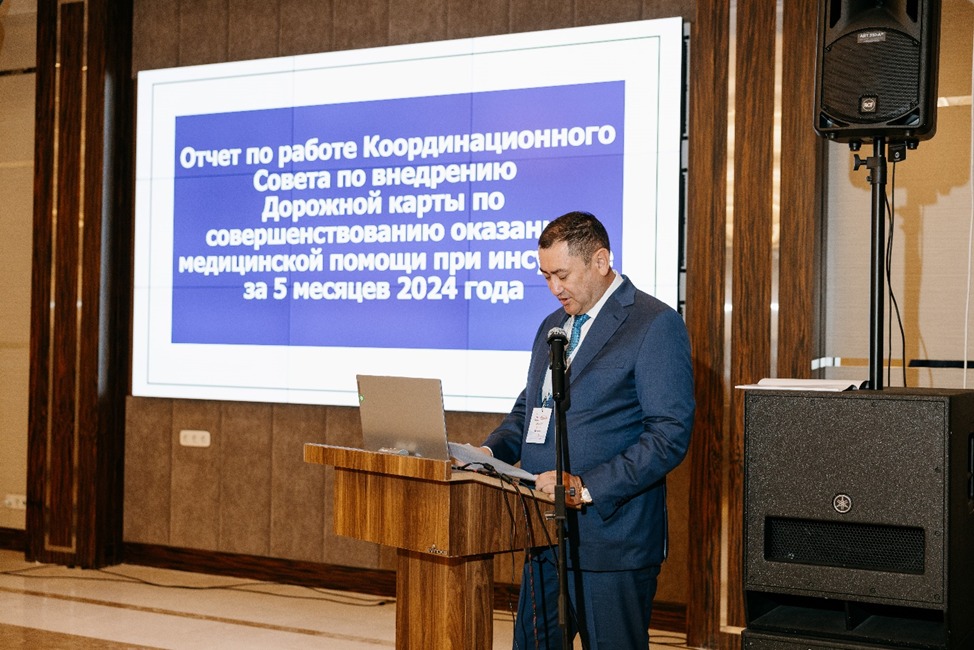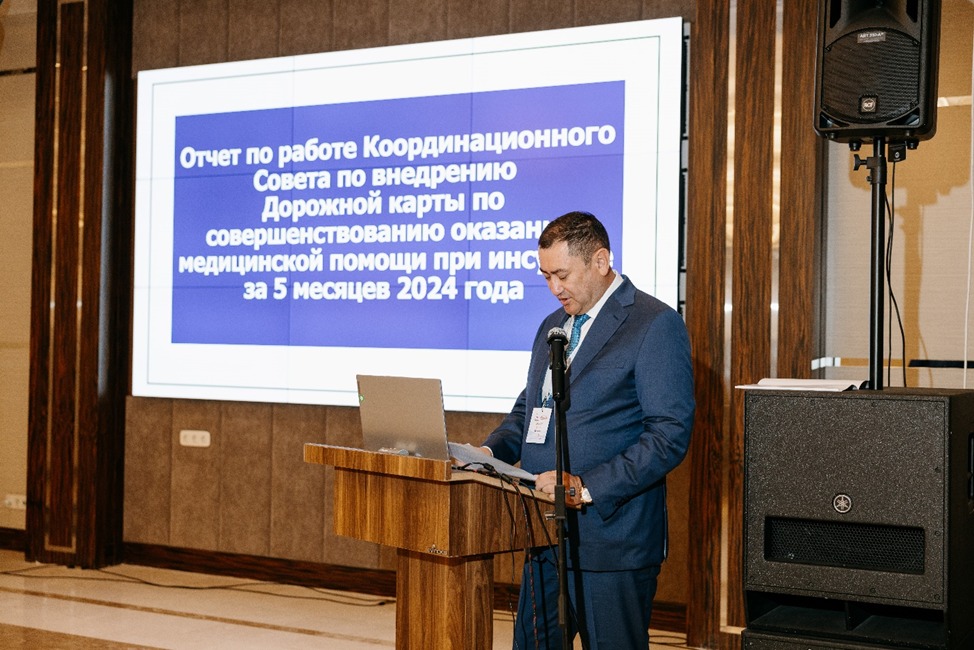
La conferencia científica y práctica de la Escuela de Ictus de Kazajistán es un evento anual importante que reúne a expertos apasionados por mejorar el tratamiento y la atención del ictus. Ahora, en su quinto año, la Escuela del Ictus de 2024 reunió a científicos de toda Kazajistán y a expertos de países como Italia, Ucrania, Letonia, Alemania y Polonia para un evento transformador en la capital, Astana.
Según Timur Muratov, presidente del RSE del Centro de Coordinación Nacional para Medicina de Urgencias REM, “un evento en el que los especialistas nacionales resumen su trabajo, mientras que los oradores extranjeros comparten su experiencia y los especialistas jóvenes adquieren nuevos conocimientos”. El Dr. Timur Muratov es médico experimentado médico y experto en salud pública que se convirtió en presidente del consejo del Centro de Coordinación Nacional para Medicina de Urgencias en 2023. Su presentación inicial en la conferencia dio un tono inspirador. Dijo: “Espero que el conocimiento obtenido sea beneficioso para todos los participantes, especialmente para los profesionales jóvenes, y que las recomendaciones dadas se implementen en la práctica”.
El Centro Nacional de Coordinación para Medicina de Urgencias fue coanfitrión del evento junto con la Asociación Pública “Liga Kazaja del Ictus”, la Asociación Kazaja de Neurocirujanos y el Centro de Coordinación Republicano para Problemas de Ictus.
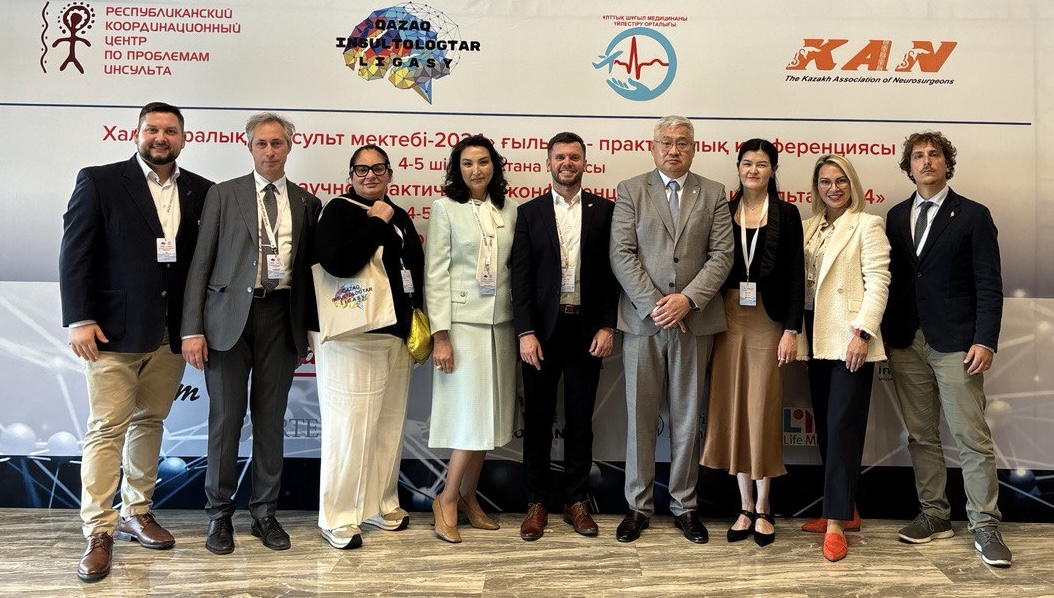
En el transcurso del evento de dos días, que comenzó el 4 de julio, expertos líderes en los campos de neurología, neurocirugía, cardiología y reanimación analizaron la organización de los servicios de ictus en Kazajistán, el diagnóstico de neuroimagen, el tratamiento del ictus mediante tratamiento trombolítico, las intervenciones quirúrgicas neuroquirúrgicas y endovasculares abiertas y la prevención secundaria. Los asistentes adquirieron una experiencia enriquecedora al participar en la clase maestra, el taller interactivo sobre atención del ictus en la fase aguda, organizado por la Iniciativa Angels el segundo día del evento.
La primera parte del programa fue una descripción general del estado de los servicios de ictus en la República de Kazajistán por la Dra. Sabina Medukhanova, directora del Centro de coordinación republicano de problemas de ictus. Su presentación allanó el terreno para los debates sobre las estrategias sanitarias nacionales destinadas a mejorar la atención del ictus en todo el país.
Francesca Romana Pezzella, copresidenta del comité directivo de la Asociación Italiana del Ictus, dio un discurso interesante sobre la implementación de la monitorización de la calidad para el ictus agudo, en la que enfatizó la importancia crítica de los protocolos de atención estandarizados para mejorar las prácticas de tratamiento del ictus.
El Dr. Yerzhan Adilbekov, presidente de la Kazakh League of Stroke, ofreció una guía práctica sobre tratamientos especializados para casos de ictus complicados en una presentación titulada “Drenaje ventricular externo para la hemorragia intraventricular no traumática”, que demostró además el objetivo de la conferencia de avanzar en la atención del ictus a través de la innovación, la colaboración y el intercambio de conocimientos especializados. Estimulación del tratamiento antihipertensivo”.
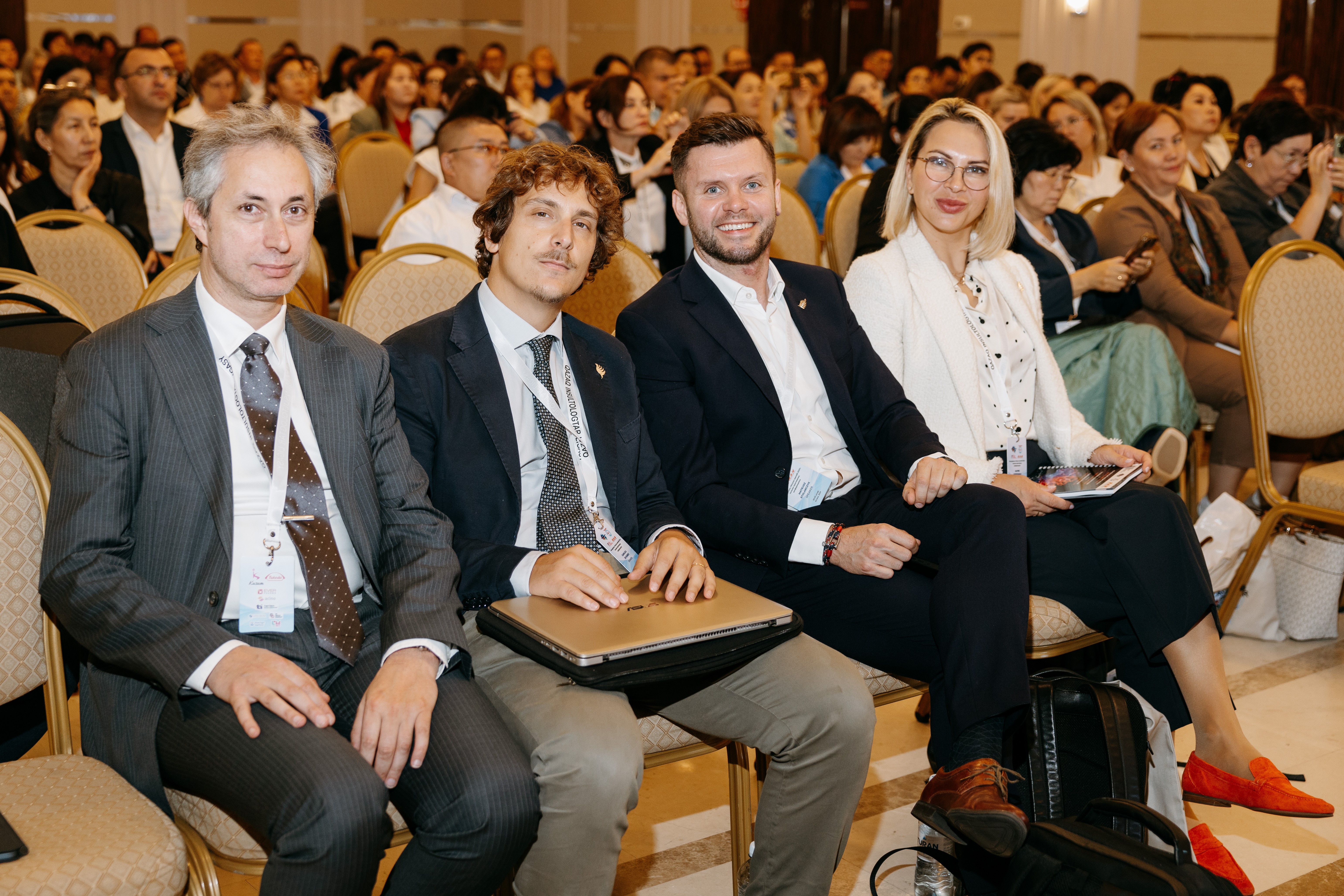
Una tendencia positiva
Los servicios de ictus de Kazajistán han experimentado una mejora significativa entre 2016 y mediados de 2002. Las tasas de trombólisis han aumentado de forma constante, del 1,33 % en 2016 al 5,40 % en la primera mitad de 2024. De forma similar, la trombectomía endovascular (TEV) ha mostrado una tendencia positiva, que aumenta del 0,05 % en 2016 al 2,10 % a mediados de 2002.
El impacto de la pandemia de COVID-19 en los servicios sanitarios probablemente contribuyó a una breve reducción de las tasas de trombólisis hasta el 4,01 % en 2020. En 2021 y 2022, más centros de ictus comenzaron a priorizar la trombectomía endovascular, lo que también afectó a los porcentajes de trombólisis. Sin embargo, tras un mayor entrenamiento y cambios estratégicos en los criterios de ingreso para mejorar los resultados de los pacientes, los centros de ictus han comenzado a comprender el beneficio “puente”, ya que la trombectomía no elimina la necesidad de trombólisis.
Al mismo tiempo, el número de centros de ictus ha aumentado de 40 en 2016 a 81 para mediados de 2002, lo que indica una infraestructura mejorada para el tratamiento y la atención del ictus. Los 81 centros de ictus de Kazajistán comprenden 30 centros integrales de ictus y 51 centros de ictus primarios. Durante el año pasado, el comité organizador de la conferencia ha estado evaluando estos centros basándose en indicadores de calidad de la atención. Esta rigurosa evaluación está diseñada para identificar y reconocer centros que proporcionan una excelente atención del ictus y establecen un punto de referencia para los estándares en todo el país. Estos avances demuestran la evolución del tratamiento del ictus y el entorno del sistema sanitario en Kazajistán, así como los esfuerzos coordinados para mejorar los resultados.
Ya hay éxitos que celebrar. Durante la conferencia, se anunció que el Hospital Regional de Kazajistán Oriental en Ust-Kamenogorsk había recibido la categoría de platino en el programa de premios Angels de la ESO. Estos premios reconocen el excelente rendimiento en la atención del ictus por parte de los hospitales de los países miembros de la ESO que recogen sus datos de pacientes con ictus en registros de mejora de calidad aprobados, como SITS-QR y RES-Q. Para poder optar a un premio, los hospitales deben cumplir criterios que estén en consonancia con las acciones probadas para mejorar los resultados después de un ictus. Para el concepto de premios es fundamental que los criterios de los premios no solo sirvan como instrumento para reconocer y recompensar la excelencia. También actúan como una checklist de comprobación para los centros de ictus y hospitales con capacidades para el ictus comprometidos a mejorar los resultados de sus pacientes y como una herramienta para abordar oportunidades de mejora.
El Hospital Regional Multidisciplinario de Petropavl también fue galardonado con un premio de oro. Estos logros significativos se reconocerán formalmente en la siguiente conferencia anual de la ESO, la ESOC, destacando sus contribuciones clave para mejorar las prácticas de atención del ictus en la comunidad de la ESO y más allá.
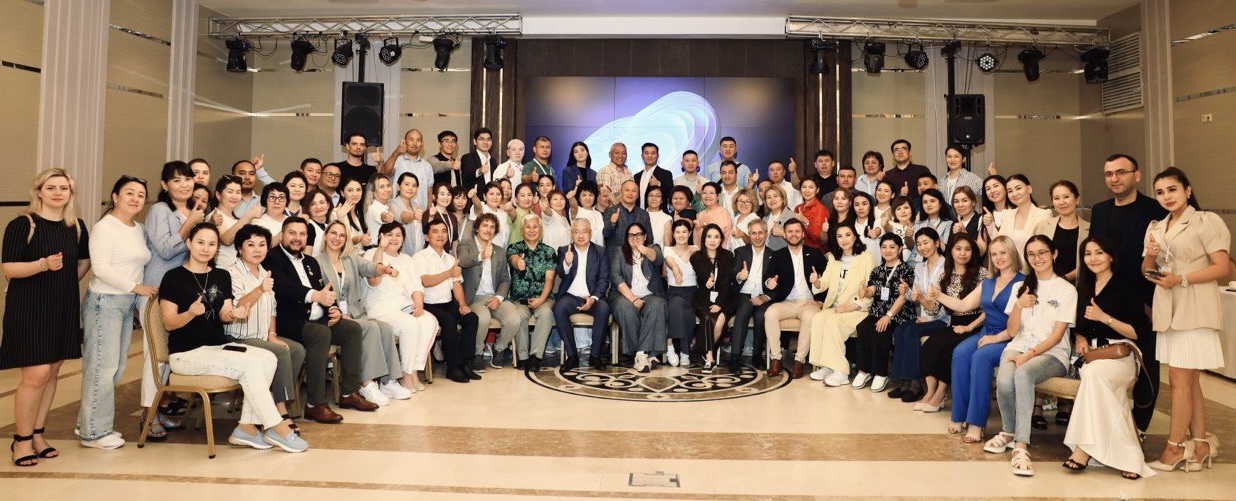
Intercambio y colaboración de conocimientos
Un aspecto destacado de la conferencia fueron las sesiones de tarde paralelas para neurocirujanos y neurólogos. Estas sesiones facilitaron el debate centrado y el intercambio de conocimientos entre expertos en cuidados del ictus y neurocirugía.
En la sesión de neurocirujanos, el Dr. Yerzhan Adilbekov presentó informes reveladores sobre dos temas cruciales: “La viabilidad de prescribir empagliflozina a pacientes con insuficiencia cardíaca crónica con ictus agudo” y “Paciente difícil en la práctica de un neurocirujano. Salir de un coma”. Estas presentaciones destacaron los avances y retos en el tratamiento de afecciones médicas complejas y atrajeron el interés de los asistentes centrados en mejorar la atención al paciente y los resultados en Kazajistán.
La conferencia incluyó a diversos oradores internacionales distinguidos, como Gianluca De Rubeis, neurorradióloga intervencionista del Hospital San Camillo Forlanini de Italia. En su discurso sobre la organización y la supervisión de la calidad de la atención del laboratorio de angiografía, el Dr. De Rubeis ofreció información valiosa sobre cómo mejorar la eficiencia operativa y la seguridad del paciente en las intervenciones neuroquirúrgicas. Presentaciones como estas sirvieron para demostrar el compromiso de la conferencia para fomentar la colaboración y compartir conocimientos para avanzar en la atención del ictus y las prácticas de neurocirugía a nivel mundial.
La sesión de los neurólogos concluyó con una presentación esclarecedora de Lev Prystupiuk, que presentó al público la Iniciativa Angels, una intervención global para aumentar el número de pacientes tratados en hospitales con capacidades para el ictus y optimizar la calidad del tratamiento en todos los centros de ictus existentes. Su presentación destacó los enfoques innovadores y las mejores prácticas dirigidas a optimizar los protocolos de atención al ictus, lo que atrajo un interés considerable de los profesionales sanitarios que buscan mejorar los resultados de los pacientes.
La Iniciativa Angels y la Dra. Francesca Romana Pezzella estuvieron entre los destinatarios de las medallas otorgadas durante la conferencia por la Liga Kazaja del Ictus en reconocimiento a su contribución al desarrollo de servicios de ictus en Kazajistán.
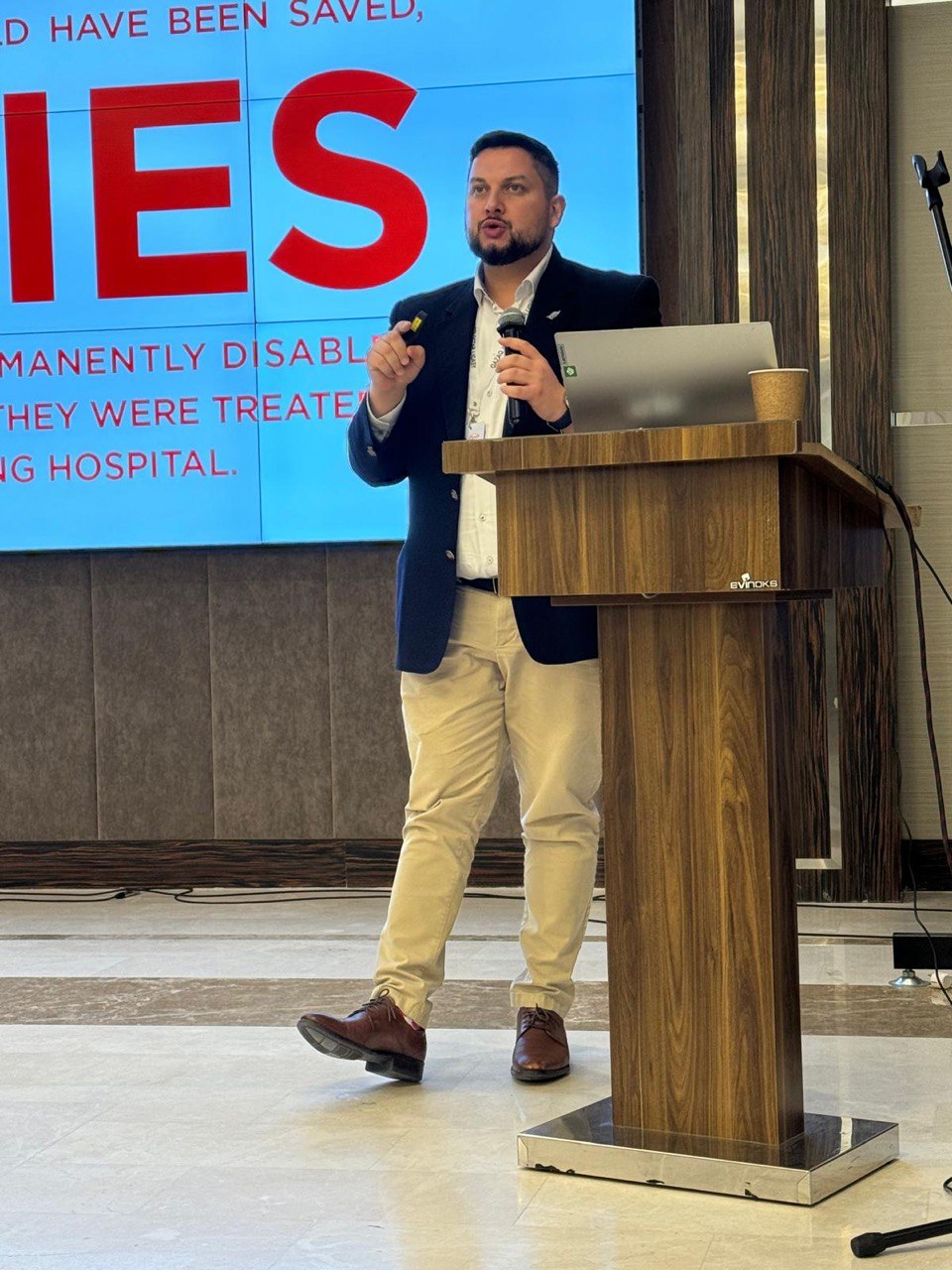
Taller interactivo
El segundo día de la conferencia, la Iniciativa Angels celebró un taller interactivo rotatorio sobre atención en la fase aguda dirigido por la Assoc. La profesora Aleksandras Vilionskis del Instituto de Medicina Clínica de la Universidad de Vilnius en Lituania y Lev Prystupiuk y Maria Sheverdina, asesores de Angels de Ucrania. Los Drs. Pezzella y De Rubeis de Italia y la Dra. Sabina Medukhanova también facilitaron conversaciones dinámicas y demostraciones prácticas durante las cuales los participantes absorbieron de forma eager los resultados de los avances. Los asistentes pasaron por sesiones sobre supervisión de la calidad utilizando el registro RES-Q, la formación de la NIHSS, la toma de decisiones con la simulación Body Interact y la aplicación clínica de la puntuación ASPECT por parte de los médicos especialistas en ictus.
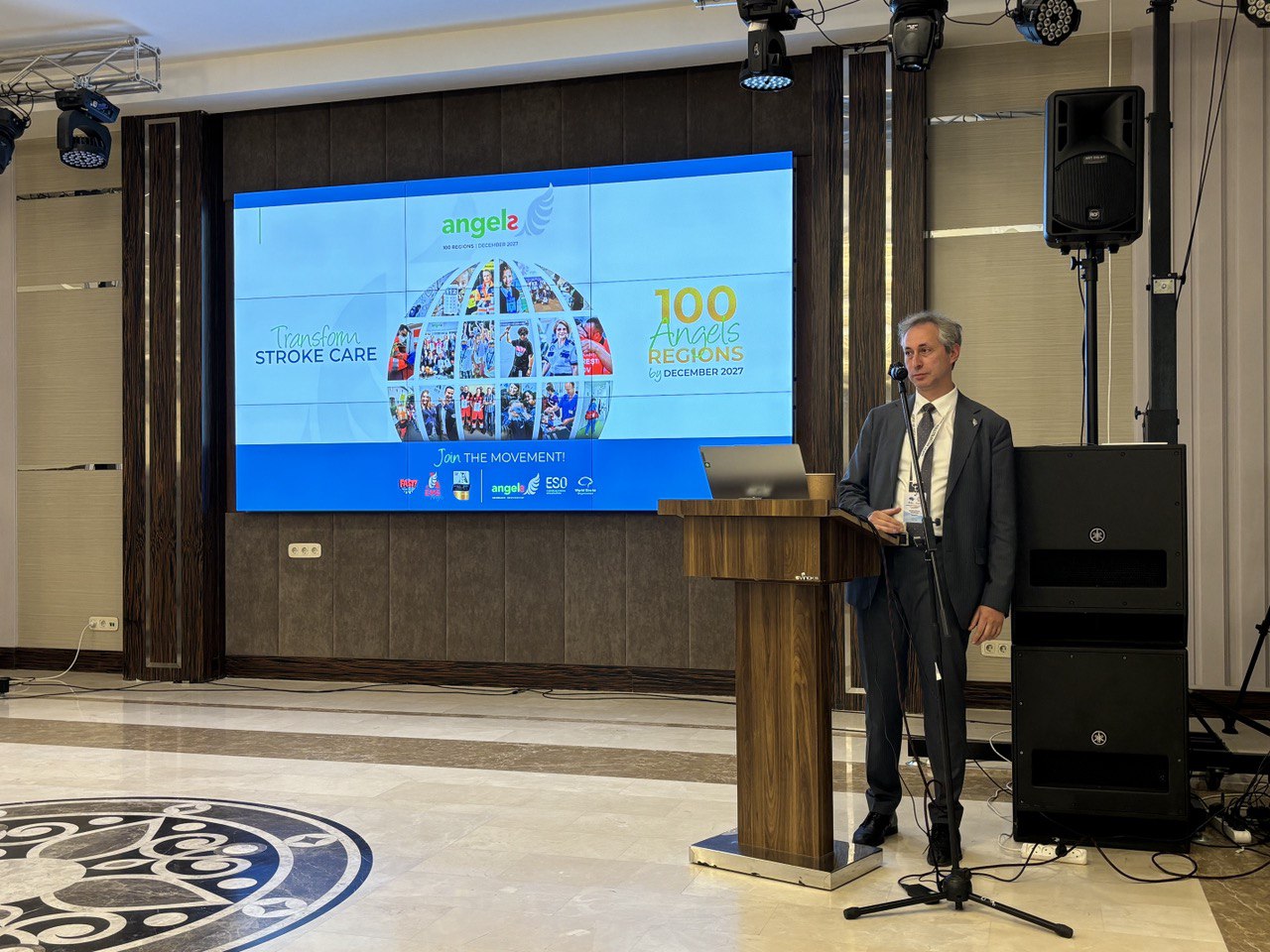
La Escuela de Ictus de 2024 proporcionó pruebas convincentes de un fuerte compromiso para mejorar los cuidados del ictus mediante colaboración, intercambio de conocimientos y adopción de las mejores prácticas. La conferencia proporcionó una oportunidad única a un grupo diverso de profesionales sanitarios e investigadores para participar en el aprendizaje colaborativo y la innovación, fomentando un entorno productivo para el avance del conocimiento en medicina de urgencias y ciencias neurológicas.
Reflexionando sobre los resultados de esta conferencia, está claro que los avances realizados en este sentido proporcionarán importantes avances en el tratamiento y la gestión del ictus en Kazajistán. El compromiso de los participantes de implementar enfoques basados en la evidencia promete un futuro brillante para mejorar los resultados de los pacientes y la calidad de la atención en Kazajistán e internacionalmente.
